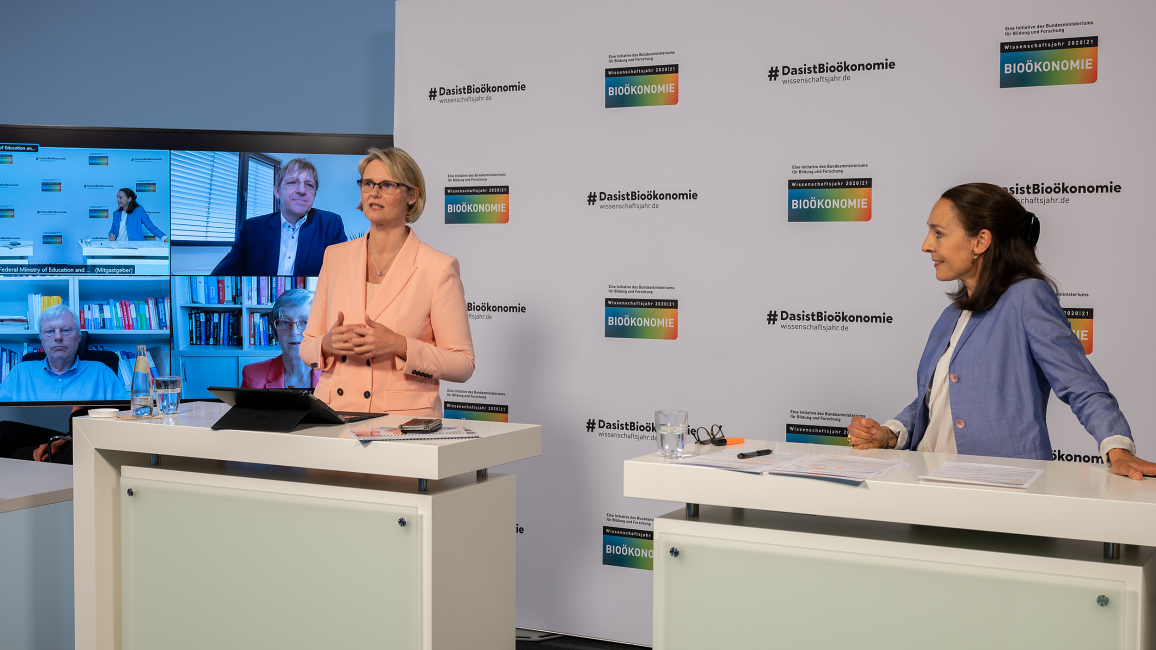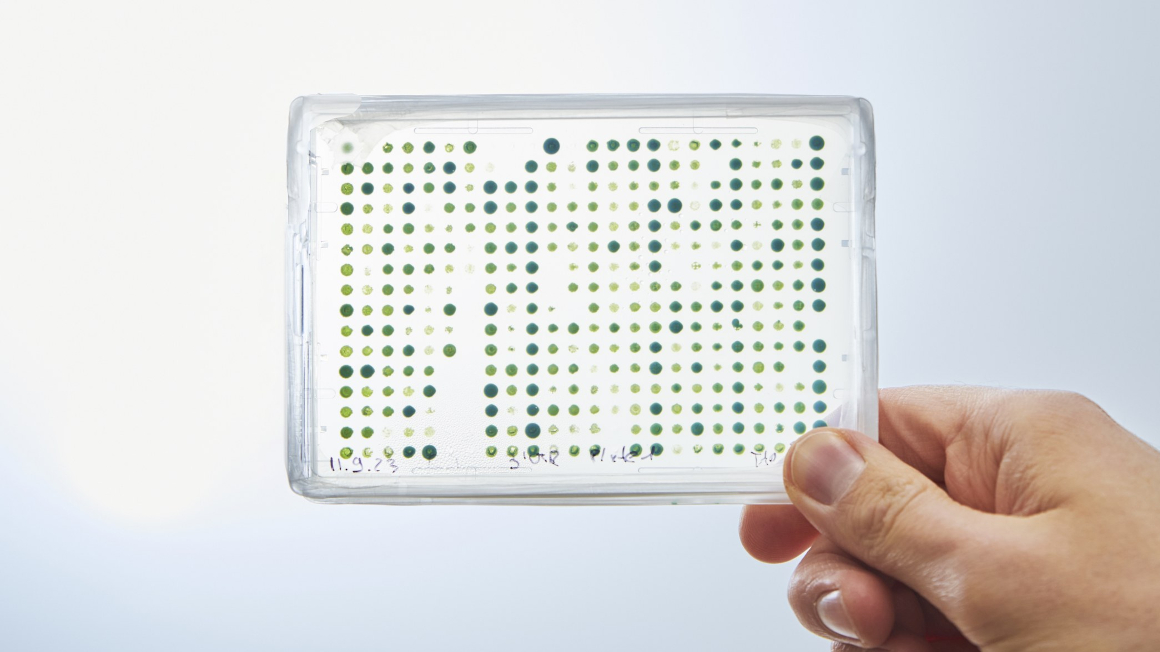With biotechnology to sustainable innovations
In its latest edition, the talk format "Karliczek.Impulse" devoted its latest edition to the smallest players in biotechnology - microorganisms and enzymes - and their important role for a sustainable circular economy.

At the third edition of the Science Year discussion series "Karliczek. Impulse.", the spotlight was on industrial biotechnology and its little helpers. A free online talk entitled "Biotechnology makes it possible - innovations for greater sustainability" was held on June 16. In the roundtable moderated by Andrea Thilo, Federal Research Minister Anja Karliczek spoke with three experts from research and practice. More than 200 interested people followed the livestream.
"Biotechnology is in many everyday products without us being aware of it," she said. "It ensures that we can do laundry, that our bread rolls get crispy or that we can be vaccinated against Corona." So-called white biotechnology uses biomolecules and microorganisms for industrial production, the federal research minister said. "Biotechnology is therefore a cornerstone of the bioeconomy. And more bioeconomy enables more sustainability."
Biotechnology as the foundation of the bioeconomy
Karl-Erich Jaeger, director of the Institute for Molecular Enzyme Technology at Heinrich Heine University in Düsseldorf at the Jülich Research Center, began his keynote speech by clarifying some key terms. "The bulky term bioeconomy in a nutshell: we make products using biological methods," Jaeger said. "Biotechnology is the biggest piece of the bioeconomy puzzle." The real heroes here are microorganisms and their diverse metabolic capabilities. In the mostly unicellular organisms such as bacteria and fungi, enzymes are the high performers because they accelerate biochemical reactions, says Jaeger. The bioindustry uses enzymes as special tools. They help conserve raw materials, reduce waste streams, and cut CO2 emissions and production costs. According to an EU study, the use of enzymes in detergents, textiles and cosmetics could save up to 42 million tons of CO2.
Sustainable circular economy as the future goal
"The future is circular economy. If we want to have a climate-neutral and sustainable economy by 2045, we need these kinds of applications," Karliczek said. That's why the German Federal Ministry of Education and Research (BMBF) supported technology development at an early stage, she said. Because experience shows that you need stamina and mature technologies that you can get on the road quickly. Jürgen Eck represented the economic perspective in the panel discussion. The former research director and head of the biotechnology company BRAIN AG now works as an innovation consultant (bio.IMPACT) and is a member of the German government's Bioeconomy Council.
"We are at the beginning of a major economic transformation," Eck said. So far, we have linear value chains that end in waste streams and CO2 emissions. We need to move toward an energy- and resource-efficient circular economy." To do that, he said, we need to build new value networks. "The winners of this development are no longer the raw material owners, but the technology owners," Eck said. Bettina Siebers heads the Institute for Molecular Enzyme Technology and Biochemistry at the University of Duisburg-Essen. She, too, emphasized why microorganisms and enzymes are indispensable players in a circular economy. "Biology ultimately works in material cycles, everything is recycled."
On the trail of extremophiles
Many potential technologies of tomorrow may still lie untapped in global biodiversity. Bettina Siebers wants to change that. "I'm a bit extreme," she opened her keynote lecture: the microbiologist researches extremophilic archaea that feel particularly at home in hot springs on Iceland or in black smokers in the deep sea. "I was fascinated by how the microbes manage to live at 90 degrees Celsius." One reason, Siebers said, is that the cells are biochemically equipped with so-called extreme enzymes. She presented a current research project called "HotAcidFactory," in which the extremophilic microbe called Sulfolobus acidocaldarius is being studied for its suitability as a novel production organism for enzymes and alcohols. The microbe is fed with crude glycerol as a residue from biodiesel production and CO2.
Microbes and enzymes in action
The ability of microbes to fix CO2 and use it to synthesize interesting substances is one of the top topics in industrial biotechnology, Eck said. He described as a highlight in terms of sustainability a bioprocess developed in Finland in which microorganisms produce food protein using only CO2 and green hydrogen. Bettina Siebers added that, for example, microbially produced rennet ferment is now an indispensable part of cheese production. Another prominent example she cited was insulin production, where bacteria or yeasts deliver purer products and thus significantly better quality.
Other applications of enzymes were also discussed, such as the relevant market of detergent enzymes. Eck explained that today, about 20 grams of enzymes are contained in a kilo package of laundry detergent. They ensure that laundry is reliably clean, even at 30 degrees and using less water. In order for consumers to be able to afford such a sustainable product, robust biotechnological manufacturing processes on a ton scale are needed, and that is high-tech. Siebers cited the polymerase chain reaction (PCR) used in corona pathogen testing as an example. "It works with enzymes derived from a thermophilic organism." Enzymes are also essential for extracting bioethanol from straw or other agricultural residues, he said.
Innovations for the market
What does it take to successfully transform findings from basic research into products and services for the market in this country? Eck expressed: "We have no shortage of bright minds and excellent universities. What we're not so good at is scaling and financing growth." He is not calling for government funding; this is where the venture capital market is needed. For example, when it comes to setting up a pilot plant for 15 million euros. " This is where we are too slow. And in the end, the fastest wins."
Jaeger pointed out that biotechnology is a time-intensive business. That still deters too many investors in Europe. The financing and innovation culture in the USA is completely different. Here, the possible failure of a company is always taken into account - without damaging the image.
Start-up funding and science communication
Karliczek said that her ministry was giving a lot of thought to how know-how and money could be better brought together. For example, she said, the German government recently provided an additional 10 billion euros for an investment fund for future technologies ("Zukunftsfonds") coordinated by KfW Capital. Among other things, the fund is intended to strengthen start-up financing. The BMBF relies heavily on experts as reviewers when evaluating funding project applications. It also attaches great importance to the issue of science communication. This includes letting people participate in knowledge processes, as in citizen science projects.
Karliczek said she wanted biotechnology to be socially accepted and used responsibly. "Not only does it help us achieve climate goals and circular economy, but it makes us competitive and creates prosperity for tomorrow."
pg


